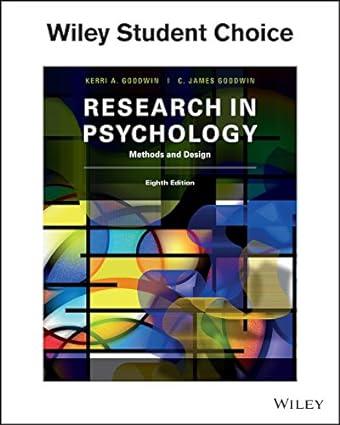In Chapter 3, you first learned about operational definitions and completed an exercise on the operational definitions
Question:
In Chapter 3, you first learned about operational definitions and completed an exercise on the operational definitions of some familiar constructs used in psychological research. In this exercise, you are to play the role of an experimenter designing a study. For each of the four hypotheses:
a. Identify the independent variable(s), decide how many levels of the independent variable(s) you would like to use, and identify the levels.
b. Identify the dependent variable in each study (one dependent variable per item).
c. Create operational definitions for your independent and dependent variables.
1. People are more likely to offer help to someone in need if the situation unambiguously calls for help.
2. Ability to concentrate on a task deteriorates when people feel crowded.
3. Good bowlers improve their performance in the presence of an audience, whereas average bowlers do worse when an audience is watching.
4. Animals learn a difficult maze best when they are moderately aroused. They do poorly in difficult mazes when their arousal is high or low. When the maze is easy, performance improves steadily from low to moderate to high arousal.
5. Caffeine improves memory, but only for older people.
6. In a bratwurst eating contest, those scoring high on a “sensation‐
seeking” scale will consume more, and this is especially true for fans of the Pittsburgh Steelers, compared with Baltimore Ravens fans.
Step by Step Answer:






